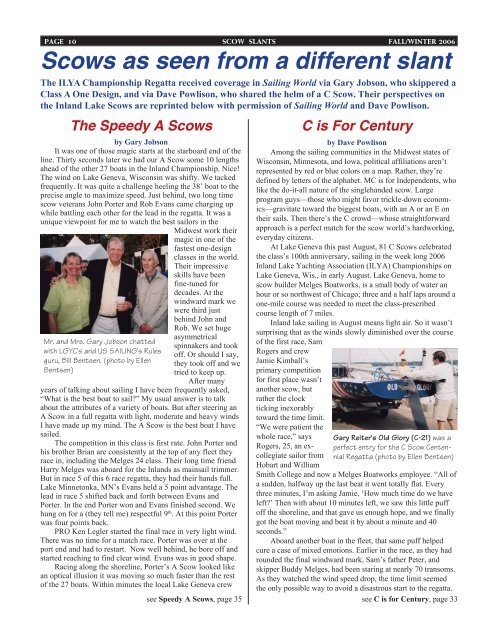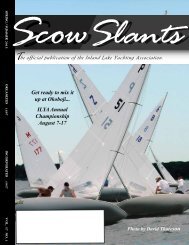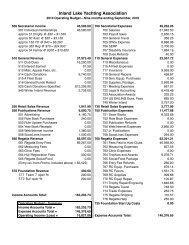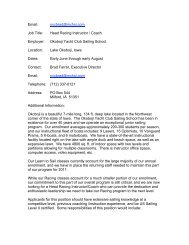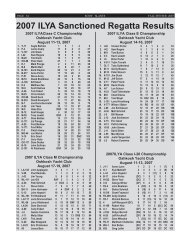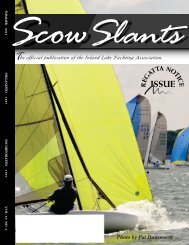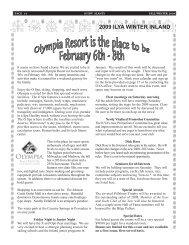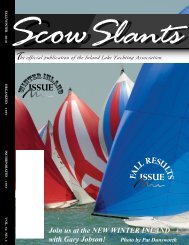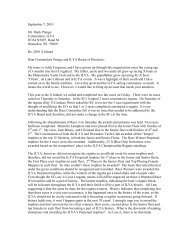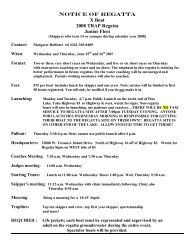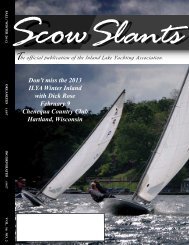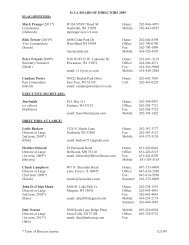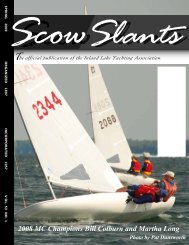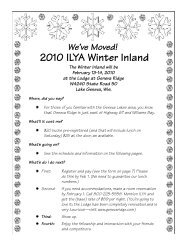35968 Scow Fall Winter - Inland Lake Yachting Association
35968 Scow Fall Winter - Inland Lake Yachting Association
35968 Scow Fall Winter - Inland Lake Yachting Association
You also want an ePaper? Increase the reach of your titles
YUMPU automatically turns print PDFs into web optimized ePapers that Google loves.
PAGE 10<br />
by Gary Jobson<br />
It was one of those magic starts at the starboard end of the<br />
line. Thirty seconds later we had our A <strong>Scow</strong> some 10 lengths<br />
ahead of the other 27 boats in the <strong>Inland</strong> Championship. Nice!<br />
The wind on <strong>Lake</strong> Geneva, Wisconsin was shifty. We tacked<br />
frequently. It was quite a challenge heeling the 38’ boat to the<br />
precise angle to maximize speed. Just behind, two long time<br />
scow veterans John Porter and Rob Evans came charging up<br />
while battling each other for the lead in the regatta. It was a<br />
unique viewpoint for me to watch the best sailors in the<br />
Midwest work their<br />
magic in one of the<br />
fastest one-design<br />
classes in the world.<br />
Their impressive<br />
skills have been<br />
fine-tuned for<br />
decades. At the<br />
windward mark we<br />
were third just<br />
behind John and<br />
Rob. We set huge<br />
asymmetrical<br />
spinnakers and took<br />
off. Or should I say,<br />
they took off and we<br />
tried to keep up.<br />
After many<br />
years of talking about sailing I have been frequently asked,<br />
“What is the best boat to sail?” My usual answer is to talk<br />
about the attributes of a variety of boats. But after steering an<br />
A <strong>Scow</strong> in a full regatta with light, moderate and heavy winds<br />
I have made up my mind. The A <strong>Scow</strong> is the best boat I have<br />
sailed.<br />
The competition in this class is first rate. John Porter and<br />
his brother Brian are consistently at the top of any fleet they<br />
race in, including the Melges 24 class. Their long time friend<br />
Harry Melges was aboard for the <strong>Inland</strong>s as mainsail trimmer.<br />
But in race 5 of this 6 race regatta, they had their hands full.<br />
<strong>Lake</strong> Minnetonka, MN’s Evans held a 5 point advantage. The<br />
lead in race 5 shifted back and forth between Evans and<br />
Porter. In the end Porter won and Evans finished second. We<br />
hung on for a (they tell me) respectful 9 th . At this point Porter<br />
was four points back.<br />
PRO Ken Legler started the final race in very light wind.<br />
There was no time for a match race. Porter was over at the<br />
port end and had to restart. Now well behind, he bore off and<br />
started reaching to find clear wind. Evans was in good shape.<br />
Racing along the shoreline, Porter’s A <strong>Scow</strong> looked like<br />
an optical illusion it was moving so much faster than the rest<br />
of the 27 boats. Within minutes the local <strong>Lake</strong> Geneva crew<br />
SCOW SLANTS<br />
FALL/WINTER 2006<br />
<strong>Scow</strong>s as seen from a different slant<br />
The ILYA Championship Regatta received coverage in Sailing World via Gary Jobson, who skippered a<br />
Class A One Design, and via Dave Powlison, who shared the helm of a C <strong>Scow</strong>. Their perspectives on<br />
the <strong>Inland</strong> <strong>Lake</strong> <strong>Scow</strong>s are reprinted below with permission of Sailing World and Dave Powlison.<br />
The Speedy A <strong>Scow</strong>s<br />
Mr. and Mrs. Gary Jobson chatted<br />
with LGYC's and US SAILING's Rules<br />
guru, Bill Bentsen. (photo by Ellen<br />
Bentsen)<br />
see Speedy A <strong>Scow</strong>s, page 35<br />
C is For Century<br />
by Dave Powlison<br />
Among the sailing communities in the Midwest states of<br />
Wisconsin, Minnesota, and Iowa, political affiliations aren’t<br />
represented by red or blue colors on a map. Rather, they’re<br />
defined by letters of the alphabet. MC is for Independents, who<br />
like the do-it-all nature of the singlehanded scow. Large<br />
program guys—those who might favor trickle-down economics—gravitate<br />
toward the biggest boats, with an A or an E on<br />
their sails. Then there’s the C crowd—whose straightforward<br />
approach is a perfect match for the scow world’s hardworking,<br />
everyday citizens.<br />
At <strong>Lake</strong> Geneva this past August, 81 C <strong>Scow</strong>s celebrated<br />
the class’s 100th anniversary, sailing in the week long 2006<br />
<strong>Inland</strong> <strong>Lake</strong> <strong>Yachting</strong> <strong>Association</strong> (ILYA) Championships on<br />
<strong>Lake</strong> Geneva, Wis., in early August. <strong>Lake</strong> Geneva, home to<br />
scow builder Melges Boatworks, is a small body of water an<br />
hour or so northwest of Chicago; three and a half laps around a<br />
one-mile course was needed to meet the class-prescribed<br />
course length of 7 miles.<br />
<strong>Inland</strong> lake sailing in August means light air. So it wasn’t<br />
surprising that as the winds slowly diminished over the course<br />
of the first race, Sam<br />
Rogers and crew<br />
Jamie Kimball’s<br />
primary competition<br />
for first place wasn’t<br />
another scow, but<br />
rather the clock<br />
ticking inexorably<br />
toward the time limit.<br />
“We were patient the<br />
whole race,” says<br />
Rogers, 25, an excollegiate<br />
sailor from<br />
Hobart and William<br />
Gary Reiter's Old Glory (C-21) was a<br />
perfect entry for the C <strong>Scow</strong> Centennial<br />
Regatta (photo by Ellen Bentsen)<br />
Smith College and now a Melges Boatworks employee. “All of<br />
a sudden, halfway up the last beat it went totally flat. Every<br />
three minutes, I’m asking Jamie, ‘How much time do we have<br />
left?’ Then with about 10 minutes left, we saw this little puff<br />
off the shoreline, and that gave us enough hope, and we finally<br />
got the boat moving and beat it by about a minute and 40<br />
seconds.”<br />
Aboard another boat in the fleet, that same puff helped<br />
cure a case of mixed emotions. Earlier in the race, as they had<br />
rounded the final windward mark, Sam’s father Peter, and<br />
skipper Buddy Melges, had been staring at nearly 70 transoms.<br />
As they watched the wind speed drop, the time limit seemed<br />
the only possible way to avoid a disastrous start to the regatta.<br />
see C is for Century, page 33


